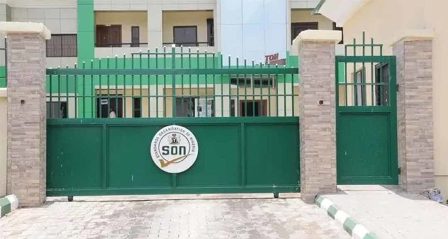Business
SON Tasks Engineers On Standards

The Standard Organisation of Nigeria (SON), has called on engineers across the country to promote standards as they consider promoting emerging technologies through innovations.
Head of Electrical and Electronics, SON, Engr Alewu Cherry Achema, made the call during the 16th International Conference and Exhibition on Power and Telecommunications organised by the Nigerian Institute of Electrical and Electronic Engineers, (NIEEE).
Speaking on the topic, ‘Prospects of Standards in Emerging Technologies,’ Achema who represented the Director General of SON, Mr. Farouk Salim, said the Federal Government was promoting innovations by making standards and quality a process of procurement.
He urged engineers to rise up to all standardisation levels to support the roadmaps developed by SON and relevant stakeholders in its latest approved and published Nigerian National Standardisation Strategies (NNSS).
Achema who listed out what engineers seeking development in technology like other nations must do, said all fields of engineering technology must engage SON, and get involved in standards development beyond the moment.
“Nigerian engineers have distinguished themselves in research and development globally; we must not wait endlessly for others to develop standards for us. The Nigerian National Committee of IEC is hungry and thirsty for participation and involvement of engineers, manufacturers of EE products, individual experts, academia, consumers,” he added.
On his part, National Chairman, Nigerian Institute of Electrical and Electronic Engineers (NIEEE), Engr. Kings Adeyemi, who spoke on ‘Benefits of Standards in Power & Telecoms Industries,’ said there were a lot of opportunities provided by standards in electricity industry.
Addressing the theme of the conference, tagged, ‘Emerging Technologies: Driving Energy and Communications Development,’ he said standards development is driving industry technological advancement, and, in some cases, defining utility business practices.
Also speaking during the virtual conference, Chief Electrical Inspector of the Federation, Nigerian Electricity Management Services Agency (NEMSA), Peter Ewesor, who spoke on ‘Prospects of Technical Standards in Nigeria’s Electricity Industry,’ said compliance to standards would ensure and guarantee adherence to industry international best practices.
Business
NCDMB, Jake Riley Empower 250 Youths On Vocational Skills

Business
NUJ Partners RSIRS On New Tax Law Education

Transport
Nigeria Rates 7th For Visa Application To France —–Schengen Visa

-

 Politics3 days ago
Politics3 days agoPFN Rejects Call For INEC Chairman’s Removal Over Genocide Comments
-

 Rivers3 days ago
Rivers3 days agoFasthire, PHCCIMA, CIPM Host CareerFest 2026 In PH
-

 Sports3 days ago
Sports3 days agoEnekwechi wins Orlen Cup in season opener
-

 Politics3 days ago
Politics3 days agoHoodlums Disrupt LP-ADC Defection Event In Lagos
-

 Sports3 days ago
Sports3 days agoFalconets, Senegalese Lionesses arrive Ibadan for qualifier
-

 Sports3 days ago
Sports3 days agoSimba open Nwabali talks
-

 Politics3 days ago
Politics3 days agoRemoval From INEC’s Portal, Abure-Led LP Faction Mulls Legal Action
-

 Niger Delta3 days ago
Niger Delta3 days agoTinubu, Jonathan, Diri Pay Last Respect To Ewhrudjakpo

